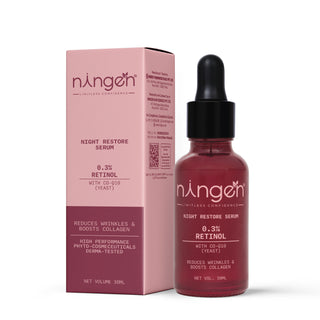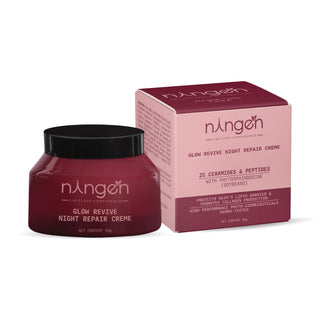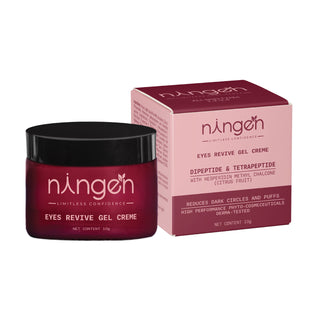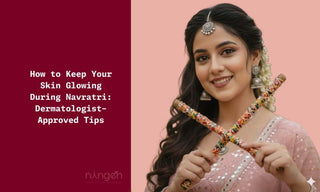TL;DR
Okay, real talk: plenty of people have spent years dealing with retinol's drama, the peeling, the redness, the whole "your face is angry at you" situation. Then they discovered bakuchiol night cream, and honestly? Game-changer. It's like retinol's chill cousin who gets the same results without making your skin freak out. But here's the plot twist: you don't actually have to pick sides. Turns out, this retinol alternative night cream ingredient can team up with retinol for even better results. This guide breaks down everything you need to know about using both for that "woke up like this" skin (but actually worked for it).
Suppose you’ve spent any time on skincare reels or beauty blogs lately. In that case, you’ve likely seen the growing fascination with bakuchiol night creams, the plant-powered breakthrough redefining the anti-aging landscape. For years, retinol held its title as the gold standard for smoother, youthful-looking skin, but not without side effects like dryness, redness, and irritation. Enter bakuchiol, a gentle yet clinically backed botanical active that delivers comparable results, minus the sting.
What’s even more exciting? You don’t have to choose between them. Science now shows that bakuchiol and retinol can actually enhance each other’s performance, creating a perfectly balanced approach to skin renewal. In this blog, “Bakuchiol Night Cream Meets Retinol: The Smart Switch for Modern Anti-Aging Skincare,” we’ll uncover how this dynamic duo works in harmony to repair, rejuvenate, and redefine your nighttime skincare routine, without compromise.
In this Guide;
The Evolution of Night Creams in Anti-Aging Skincare
Retinol: The Gold Standard That Started It All
Bakuchiol: The Plant-Based Retinol Alternative
Why Bakuchiol and Retinol Work Better Together?
How to Incorporate Both in Your Night Skincare Routine?
Does Combining Bakuchiol and Retinol Really Work?
The Evolution of Night Creams in Anti-Aging Skincare
Can we just take a moment to appreciate how far we've come from those thick, heavy night creams your mom used? You know the ones, they sat on your face like grease, and you'd wake up with half of it on your pillowcase.
Night creams today are a whole different beast. Scientists figured out that your skin basically turns into a repair factory while you're sleeping. Between 11 PM and 4 AM, your skin cells are regenerating like crazy, which makes nighttime the VIP hour for anti-aging ingredients to do their thing.
That's why bakuchiol night cream formulas are so clever. They're designed to work with your skin's overnight shift, not just sit there looking moisturizing. We've gone from "slap something on before bed" to actually strategic skincare that targets what's happening at the cellular level.
And honestly? This shift reflects what everyone wants now: results without the suffering. No one has time for treatments that make you look worse before you look better.
Retinol: The Gold Standard That Started It All
Look, we have to give retinol its flowers. This stuff is legendary for a reason.
Retinol (vitamin A) has been the anti-aging MVP for decades because it actually works. We're talking serious results: more collagen, faster cell turnover, faded dark spots, smoother skin. Dermatologists love it because there are literally mountains of research proving it delivers (National Institutes of Health). Like, thousands of studies backing this one ingredient.
But, and this is a big but, retinol can be kind of a nightmare to live with.
You know the drill: that first week when your skin starts peeling like a snake shedding its skin. The redness that makes you look perpetually sunburned. The dryness that no amount of moisturizer seems to fix. Plenty of people quit retinol after two weeks because they can't deal with the "retinol uglies."
Plus, if you're pregnant or nursing, retinol is completely off the table. And even if you can tolerate it, you're basically married to SPF 50 forever because retinol makes your skin crazy sensitive to the sun.
This is exactly why people started searching for a retinol alternative night cream, and why bakuchiol became the cool new thing everyone's talking about.

Also read: The power of retinol.
Bakuchiol: The Plant-Based Retinol Alternative
Bakuchiol (say it with me: buh-KOO-chee-all) sounds trendy, but it's actually been around forever. People in India and China have been using this stuff from the babchi plant for literally centuries in traditional medicine.
What's wild is that science is finally catching up. A major 2018 study in the British Journal of Dermatology basically proved what those ancient practitioners already knew: bakuchiol works as well as retinol for reducing wrinkles and dark spots, but without turning your face into an angry, flaky mess (Wiley Online Library).
Here's what your anti-aging bakuchiol night cream is actually doing while you sleep:
It's telling your skin to make more collagen (hello, firmness), speeding up that cell turnover so fresh skin comes to the surface, evening out your skin tone and fading those annoying dark spots, fighting free radicals like a tiny antioxidant superhero, and calming inflammation instead of causing it.
The best part? You can use it in the morning without worrying about the sun. You can use it while pregnant (always check with your doctor first, obviously). You can use it on sensitive skin without your face staging a protest.
For everyone juggling a million things, whether you're building a career, raising kids, or just trying to function as an adult, bakuchiol is that friend who shows up and makes everything easier.

The Perfect Partnership: Why Bakuchiol and Retinol Work Better Together?
Here's where things get interesting: bakuchiol and retinol don't have to be rivals. They can actually be teammates.
Sounds counterintuitive, right? But stick with us here.
While bakuchiol works great on its own as a retinol alternative night cream, new research is showing that using them together might actually make both ingredients work better while keeping retinol from being such a drama queen.
Imagine retinol as a high-intensity interval training class that gets results but leaves you sore, and bakuchiol as recovery yoga that gives you a bounce back after the workout. Together? You get stronger without burning out.
Here's why this combo makes sense:
Retinol stability: Bakuchiol actually helps retinol stay effective longer by preventing it from breaking down when exposed to light and air. Your expensive retinol serum gets more mileage.
The buffer effect: Bakuchiol's soothing properties can tone down retinol's harsh side. This means you can actually use your retinol consistently instead of taking "my skin needs a break" weeks.
Different but complementary: They both boost collagen and speed up cell renewal, but they take slightly different routes to get there. Using both might give you that 1+1=3 effect.
Bonus protection: Bakuchiol brings antioxidant benefits that retinol doesn't offer, so you're getting more comprehensive anti-aging coverage.
If you've been using retinol forever and hit a plateau, adding a bakuchiol night cream might kick things up a notch. If you're retinol-curious but scared, bakuchiol can help your skin build tolerance first.
How to Incorporate Both in Your Night Skincare Routine?
Alright, let's get practical. Here's how to actually use these ingredients without confusing your skin (or yourself).
Starting from scratch? (New to both) Begin with just bakuchiol night cream for 4-6 weeks. Use it every night after cleansing, easy peasy. Once your skin's comfortable, add retinol slowly. Like, once or twice a week, slowly. Don't be a hero.
Already a retinol person? Just layer your bakuchiol night cream over your retinol serum. Or find a product that has both already mixed together. The bakuchiol will help calm any leftover irritation from the retinol.
The alternating approach: Use retinol three nights a week, bakuchiol the other four. This gives you retinol's power moves with built-in recovery time. Many people love this method—it feels balanced.
The full layering routine:
-
Wash your face (properly, not just splashing water)
-
Toner, if that's your thing
-
Let your skin dry completely
-
Wait 5-10 minutes
-
Apply a hydrating serum
- Apply your anti-aging bakuchiol+ retinol night cream
-
Eye cream around the eyes
Also read: How to start with Retinol?
Does Combining Bakuchiol and Retinol Really Work?
You might be wondering: "Is this actually legit, or just another skincare trend?"
Fair question. The research on using them together is still pretty new, but what exists is promising. More dermatologists are recommending this combo, especially for people who want retinol results without the retinol misery (American Academy of Dermatology).
What real people are saying: folks using both bakuchiol night cream and retinol together report that their skin texture and tone improved faster, they had way less irritation than with retinol alone, they could use retinol more often without their face revolting, and their overall skin barrier seemed healthier and stronger.
The science checks out too. Bakuchiol's anti-inflammatory superpowers create a better environment for retinol to work without your skin going into defense mode. Your skin accepts the treatment instead of fighting it.
Timeline expectations (because patience is hard):
-
First 2 weeks: Your skin feels more hydrated, looks smoother
-
4-6 weeks: Fine lines start softening, you've got that glow happening
-
8-12 weeks: Deeper wrinkles improve, dark spots are fading
-
3-6 months: Real collagen rebuilding, your skin actually looks firmer
Look, we wish we could tell you it happens overnight, but that's not how skin works. The good news? Consistency beats intensity every time.
The Science of Overnight Renewal
Why are we so obsessed with what we put on our faces at night? Because nighttime is literally when your skin does its best work.
Your skin has its own internal clock (fancy term: circadian rhythm), and when you're asleep, some pretty cool stuff happens. Your skin temperature goes up a bit, which means products sink in deeper. Blood flow to your face increases by up to 50%, more nutrients, more oxygen. Your cells multiply two to three times faster than during the day. And cortisol (the stress hormone that breaks down collagen) drops while melatonin (an antioxidant) kicks in.
This is exactly why slapping on a bakuchiol night cream before bed is so effective. You're not just moisturizing, you're timing your skincare to match your body's natural repair schedule.
Think of it this way: your night cream is like the night crew at a construction site, coming in after hours to repair damage and build new structures. You go to sleep looking tired, and wake up looking refreshed because actual cellular work happened.
It's not magic, it's biology working in your favor.
Final Takeaway: Smarter Skincare for the Modern Age
Here's the thing: we're past the era of choosing between "natural but weak" or "effective but brutal." That's old-school thinking.
The whole point of a bakuchiol night cream—whether you use it solo as a retinol alternative night cream or pair it with retinol. is that you don't have to sacrifice anymore? You can have gentle and effective. You can have science-backed and skin-friendly.
We're all busy, stressed, tired humans trying to take care of ourselves while juggling approximately 47 other things. You want skincare that actually works but doesn't require a three-week recovery period. You want products that respect your skin instead of traumatizing it. And you want to wake up looking like you slept well, even when you didn't.
This anti-aging bakuchiol night cream approach gives you exactly that. It works as hard as you do, treats your skin with respect, and delivers results you can actually see in the mirror.
Start wherever you're at. Sensitive skin or retinol horror stories? Begin with bakuchiol alone. Already a retinol fan looking for better results? Add bakuchiol to your routine. Totally new to active ingredients? Bakuchiol is your perfect starting point.
Your skin in five years will be determined by what you do (or don't do) today. Pick products you'll actually use consistently, not ones that sit in your bathroom cabinet because they're too harsh.
Sweet dreams—and even sweeter skin when you wake up.
Frequently Asked Questions
Q1: Can I use bakuchiol during the day?
A: Yep! Unlike retinol, bakuchiol is totally fine for morning use. But if you're using both, nighttime application makes the most sense.
Q2: Can I use bakuchiol night cream if I'm pregnant?
A: Generally, bakuchiol is considered safer than retinol during pregnancy, but seriously—ask your doctor first. Every pregnancy is different, and you want to be sure.
Q3: Will bakuchiol make me break out like retinol does at first?
A: Nope! Bakuchiol doesn't cause that whole "purging" phase where your skin freaks out initially. That's one of its best features, honestly.
Q4: How long before I actually see something happening?
A: You'll feel the difference (smoother, more hydrated) in 2-4 weeks. Visible changes like fewer fine lines and faded spots? Give it 8-12 weeks of consistent use.
Q5: I have acne-prone skin. Is this going to break me out?
A: Actually, bakuchiol is great for acne-prone skin! It has antibacterial properties and won't clog your pores. Plus, you still get the anti-aging benefits.
Q6: Do I need a separate moisturizer on top?
A: Most bakuchiol night creams are already formulated as complete moisturizers. But if you have super dry skin, feel free to layer more moisture on top.
Q7: Is this just a girl thing, or can guys use it too?
A: Everyone's welcome! Anti-aging ingredients don't discriminate by gender. Actually, a lot of guys prefer bakuchiol because it works without the irritation that might scare them off skincare.
References and Further Reading
-
National Institutes of Health - Retinoids in the treatment of skin aging
-
British Journal of Dermatology - Prospective, randomized, double-blind assessment of topical bakuchiol and retinol
-
American Academy of Dermatology - Retinol and Retinoids
-
Journal of Cosmetic Dermatology - Bakuchiol studies and clinical research
-
Dermatology and Therapy - Plant-based alternatives in skincare
-
Cleveland Clinic - Skin Care and Aging
-
Mayo Clinic - Wrinkle creams: Your guide to younger-looking skin









